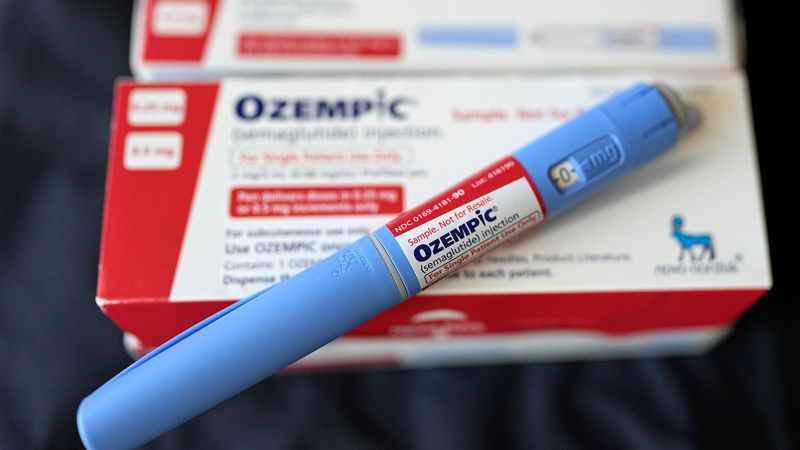Main Topic: Investigation into the potential risk of self-injury and suicidal thoughts associated with the use of Ozempic and Wegovy, drugs used to lower blood sugar and suppress appetite.
Key Points:
1. Health regulators in Europe and the UK are reviewing reports of self-injury and suicidal thoughts among individuals taking Ozempic and Wegovy.
2. Clinical trials have not shown evidence of an increased risk of these side effects, but the US FDA requires a warning for weight management medications that work on the central nervous system.
3. Some patients have reported severe psychological reactions to GLP-1 receptor agonists, but doctors and clinical trials have not observed a clear trend or correlation between the drugs and these side effects.
Main Topic: Lawsuit alleges that Novo Nordisk and Eli Lilly failed to adequately warn patients about the risk of severe stomach problems associated with their diabetes drugs Ozempic and Mounjaro.
Key Points:
1. Lawsuit claims that the drugs can cause gastrointestinal injuries, including severe gastroparesis and persistent vomiting.
2. GLP-1 agonists like Ozempic and Mounjaro can slow down food movement through the stomach, leading to feelings of fullness, but can also cause gastrointestinal issues.
3. Over 400 people have come forward claiming gastrointestinal injuries from the drugs, and the lawsuit expects thousands of similar cases.
The Danish pharmaceutical company Novo Nordisk, known for its weight loss drugs Ozempic and Wegovy, is driving most of Denmark's recent economic growth and has become the second most valuable public company in Europe.
The rise of diabetes and weight loss drugs like Ozempic is not only impacting pharmaceutical companies, but also retailers, makers of weight loss products, and other industries, with knock-on effects ranging from increased foot traffic in stores and changing consumer behavior to potential disruptions in the diet industry.
GLP-1 agonists, such as Ozempic and Wegovy, used to treat diabetes and weight loss have shown potential in reducing cravings for alcohol, nicotine, opioids, and compulsive behaviors, although more research is needed to confirm their effectiveness as addiction treatments.
The sale of anti-obesity drugs in Denmark, particularly Ozempic and Wegovy, has significantly boosted the country's economy and prevented it from entering a recession, with the pharmaceutical industry adding almost two percentage points of growth to the GDP in the first half of 2023. The success of these drugs has also made Novo Nordisk, the company behind them, the highest valued company in Europe.
Anti-obesity drugs developed by Novo Nordisk and Eli Lilly have the potential to transform public health but could also disrupt industries such as food, fitness, and healthcare, affecting companies like Nestlé and McDonald's.
The rise of GLP-1 weight loss drugs like Ozempic and Wegovy has the potential to impact various industries, with drug manufacturers such as Novo Nordisk and Eli Lilly expected to benefit, while medical device companies, fast-food chains, and beer and tobacco companies could be at risk.
The demand for diabetes and obesity drugs, such as Ozempic and Wegovy, has increased by 300% in the last two years, with Ozempic accounting for 65% of total prescriptions due to its off-label use for weight loss, but future prescription volumes will depend on supply shortages and other factors.
The FDA has added a new warning about intestinal blockage to the labeling of the popular weight loss drug Ozempic, which is classified as a GLP-1 medication and has been associated with gastrointestinal side effects.
Drugmakers spent nearly $500 million on advertisements for obesity and diabetes treatments in the U.S. during the first seven months of this year, with Novo Nordisk's Ozempic and Wegovy leading the pack.
The popularity and usage of weight-loss drugs like Ozempic are causing a decrease in sales for snack makers as customers on these medications are cutting back on high-fat and salty treats due to appetite suppression.
Anti-diabetic drugs like Ozempic and Wegovy, known for their weight loss effects, are causing shoppers to reduce their grocery purchases, leading to stock drops for beer and snack distributors such as Nestle, Mondelez International, and Kraft Heinz.
Danish drugmaker Novo Nordisk will stop a trial studying Ozempic, a diabetes drug, to treat kidney failure in diabetes patients ahead of schedule due to clear evidence that the treatment would succeed.
Novo Nordisk's stock surged after suggesting that its diabetes drug, Ozempic, may have the potential to treat chronic kidney disease, causing stocks of dialysis providers DaVita and Fresenius to plummet.
Novo Nordisk's Ozempic study for treating chronic kidney disease was halted early after showing promising interim results, leading to a surge in Novo Nordisk ADRs and a decline in shares of dialysis machine and insulin pump makers.
Novo Nordisk has raised its full-year sales and operating profit outlook for the third time this year due to strong demand for its weight-loss drug Wegovy and diabetes medication Ozempic in the United States, leading to a record-high in its shares.
The popularity of weight-loss supplement Ozempic is impacting Walmart, with data showing a slight pullback in overall basket from those who take the drug, although shoppers on Ozempic are actually spending more money at the retailer, primarily in other categories such as health and wellness. This suggests that the cohort of people taking Ozempic and similar medications has not yet offset the rest of the customer base when it comes to food shopping.
Nestlé is developing companion products for weight-loss drugs, such as Ozempic and Wegovy, to address concerns about decreased demand for food products.
Extraordinary demand for Novo Nordisk's Ozempic and other weight-loss drugs is leading to a surge in counterfeit versions, prompting law enforcement and public health officials to take action by opening inquiries, monitoring e-commerce and social media, and teaching customs officials to spot counterfeits.
